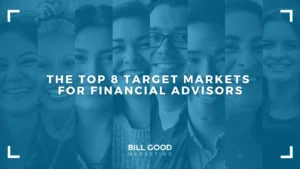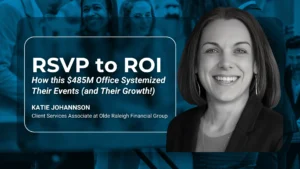There’s a story often told in this business. It sounds reasonable, even logical: if you’re spending too much time on smaller accounts, you’ll grow faster if you let them go.
Fire the bottom 20%. Focus on the big fish.
The story whispers efficiency, growth, freedom.
But here’s the question we need to ask: is it worth it?
For decades, financial advisors have followed this advice from other coaches like it’s a map to buried treasure. Our stance? It’s more like a recipe for trouble. Bill Good, our founder, put it best:
“Cutting smaller clients isn’t a strategy—it’s a guaranteed income reduction plan. The clients you dismiss today may be the very ones who fuel your growth tomorrow.”
The relationships you build as a financial advisor—no matter how small the account—are more than just numbers on a ledger. They’re the phone call that turns into a referral, the retiree whose inheritance transforms their modest IRA into a cornerstone of your business. The young professional just starting out on their journey who could add a considerable sum to their savings. The trust and goodwill that define these relationships demand more from you. Helping them forward is at the essence of what it means to be a fiduciary.
Sure, there are times when a breakup is necessary. Maybe a client refuses to communicate or won’t follow your advice. Maybe they’re downright abusive. (More on this later)
But here’s the thing: firing clients simply because they’re “too small” isn’t just shortsighted. It’s the kind of decision that robs your future to make your present feel easier.
And the consequences of cutting clients can go far beyond lost opportunities. Our founder, Bill Good often recounts the story of a top advisor in a small town who pruned 400 accounts from their book, based on their new set “minimums” — thinking it would free up time for bigger new clients.
Instead, they created something far worse than inefficiency: ill will.
As Bill tells it,
“That advisor can’t even go to the grocery store without running into someone they dismissed. And every time, they get publicly berated for it…”
Before you prune your client base, pause. Think about what you’re really cutting away. The clients who seem small today might just surprise you tomorrow. Because in this business, success isn’t just about efficiency—it’s about trust. And trust is something you build, not something you discard.

Why You Shouldn’t Fire Smaller Accounts
There’s a belief in the industry that smaller accounts are a distraction, a drag on your time and resources.
The logic sounds appealing: cut the bottom 20%, free up your energy for the top-tier clients, and watch your business soar.
But here’s the reality—and it’s a line our Founder, Bill Good, has been telling for decades:
“Firing smaller clients isn’t efficiency. It’s a mistake. They’re not a burden; they’re your future.”
Smaller accounts often hold hidden value, the kind that doesn’t show up in today’s metrics but pays dividends down the line. Let’s uncover what you’re really giving up when you let them go.
Smaller Clients Are Tomorrow’s Big Accounts
Smaller accounts aren’t static; they’re dynamic. A retiree with a modest IRA today might inherit significant assets tomorrow. A client buying a few shares of ETFs this year might receive a windfall from selling property next year.
Real stories prove the point:
- The small client who referred their sibling with significant assets.
- The long-time client you helped with some personal finance issues who inherited a million-dollar estate.
- The modest account that grew through consistent contributions to large retirement accounts.
When you prune smaller accounts, you cut off opportunities like these. You’re not just losing a client; you’re losing their potential—and that’s not a trade you want to make.
Referrals Often Come from Smaller Accounts
Here’s a counterintuitive truth: your biggest advocates are often your smallest accounts. They’re loyal because you’ve treated them well. They’re invested because you’ve taken the time to care. And they’re talking about you because they see the value in your work.
These clients don’t just bring new business; they bring trust. A referral from a smaller client comes with built-in credibility. And as every financial planner knows, trust is the hardest currency to earn in this business.
The reality is that some of the larger accounts opened by advisors we’ve worked with have come from referrals from smaller clients. And we are not just talking million-dollar accounts, though those come. We are talking $10 million and larger.
Feeding the Competition
Think about what happens when you fire a client. Where do they go? Straight into the open arms of robo-advisors, discount brokerages, or new advisors eager to build their book. These competitors are thrilled to take on the clients you’ve let go—and they’ll happily nurture them into high-value accounts. Our founder, Bill Good puts it this way:
“Every time you prune your book, you’re feeding the competition. You’re not just handing them accounts; you’re giving them the foundation for their success.”
The long-term cost is even greater. As your ex-clients grow their wealth elsewhere, they’re likely to take referrals and potential new business with them. The ripple effect of losing one client can extend far beyond their current balance sheet.
Ethical Considerations: Doing Right by Your Clients
Let’s not ignore the moral dimension. Firing a client because they don’t meet a certain financial threshold runs counter to basic ethical principles. You could even question whether you are acting as a fiduciary. Your role as their current advisor is to guide and support, regardless of account size. As our founder, Bill says,
“No one forced you to take that client on. If they trusted you enough to work with you, they deserve your respect and attention.”
Clients aren’t just numbers. They’re people with hopes, goals, and challenges. Treating them as disposable sends the wrong message—to your clients, your team, and your industry.
A Smarter Way Forward
Before you consider pruning your client base, pause. Ask yourself:
- What could this client become with the right guidance?
- How have they contributed to your practice beyond their balance sheet?
- What message does firing them send to others?
Because here’s the truth: the bottom line isn’t just about today’s revenue. It’s about the relationships, opportunities, and growth you’re building for tomorrow. And in the world of wealth management, those who think long-term win.

How to Make Smaller Accounts Work for You
Smaller accounts aren’t dead weight. They’re not a distraction or a drain on your time. With the right mindset and tools, they can become one of the most valuable parts of your client base. The secret? It’s not about cutting them loose. It’s about managing your time with them smarter.
Here’s something worth considering: bringing in new clients isn’t cheap.
The time and effort you invest in prospecting, meetings, and onboarding all add up. In fact, a recent study revealed that the average cost to acquire a new client is over $3,119, with the 80% of that expense coming from the advisor’s time.
By comparison, keeping your smaller accounts engaged and nurtured costs far less. Our founder, Bill Good has long argued that smaller accounts are a goldmine waiting to be tapped:
“When you delegate, automate, and communicate effectively — even the smallest accounts can deliver huge returns.”
Let’s break down how you can make smaller accounts work for you.
1. Delegate Like a Pro
You don’t have to handle every detail yourself. In fact, you shouldn’t. Your role as their financial planner is to focus on big-picture strategies: crafting investment strategies, analyzing portfolios, and helping clients achieve their financial goals. The day-to-day? That’s what a well-structured team is for.
- Junior advisors or associates can take on smaller accounts directly, building their experience while maintaining the relationship. They can handle routine transactions like trades in mutual funds, ETFs, or rebalancing retirement accounts.
- Service assistants can manage client inquiries about statements, the IRS, or administrative tasks.
Delegation isn’t just efficient—it’s transformative. It turns a time-sink into a revenue stream.
2. Automate Where It Makes Sense
Technology can do the heavy lifting for you. Tools like CRM systems, email marketing campaigns, and portfolio management software can keep smaller clients engaged without draining your resources.
- Keep them informed: Send monthly updates on market trends, changes in personal finance laws, or highlights about the stock market.
- Stay in touch: Automate birthday and milestone messages—small gestures that make a big impact.
- Track progress: Use dashboards to monitor risk tolerance, capital gains, and account activity at a glance.
Automation doesn’t replace the human touch, but it ensures every client feels valued—even when you’re not speaking with them directly.
3. Create Tiered Service Levels
Not every client needs the same level of attention. That’s okay. The key is to structure your offerings so that each client gets what they need without overextending yourself. That key is a good client service model.
- Smaller accounts: Provide consistent communication through newsletters, group webinars, or quarterly check-ins about their financial situation.
- Larger accounts: Offer personalized in-person meetings, tailored estate planning, and bespoke wealth management strategies.
Tiered service isn’t about playing favorites—it’s about allocating resources wisely while ensuring no one feels left behind.
4. Build a Long-Term Vision
Smaller accounts aren’t just about the here and now. They’re an investment in your future. Over time, clients grow their wealth, receive inheritances, sell businesses, and consolidate assets. By maintaining these relationships, you position yourself as the go-to advisor when their financial picture changes.
Think about the long game:
- A client with $20,000 in investment assets today might bring you the $2 million received at the end of a real estate deal they no longer wanted to manage.
- A young professional with a starter IRA could become a cornerstone client as their wealth grows.
When you cut these clients loose, you’re not saving time—you’re leaving future growth on the table.
5. Create a Team-Based Culture
It’s not just about you—it’s about the team behind you. A strong team culture ensures that every client, no matter their size, gets the care and attention they deserve.
Our founder, Bill Good has long championed the team approach:
“Your time is worth $1,500 an hour. But that doesn’t mean every client interaction has to cost that. With the right team, you can provide first-class service to every client without sacrificing your own productivity.”
Bottom Line: Small Can Be Big
The myth that smaller accounts aren’t worth your time is just that—a myth. Managed correctly, these clients can become some of the most profitable, loyal, and impactful relationships in your book. It’s not about pruning. It’s about planting seeds for the future.

When Should You Fire a Client as a Financial Advisor?
Ok, so you don’t fire a client based on account size. Can you fire a client?
Firing a client. It’s a loaded phrase, isn’t it?
It feels harsh, final, like a chapter closed before its time. And yet, as a financial advisor, there are moments when walking away isn’t just an option—it’s a necessity.
But here’s the thing: it’s not about convenience, and it’s certainly not about the size of their account, as we’ve discussed. The decision to let a client go should be rooted in ethics, mutual respect, and the future health of your practice.
So, when is it time to fire a client? Not often, but here’s when it might be necessary:
1. When the relationship turns toxic
Some clients aren’t just challenging; they’re corrosive. Every phone call feels like a battle, every in-person meeting leaves you or your team emotionally drained. Maybe they’re disrespectful, dismissive, or downright abusive. Bill Good doesn’t mince words on this:
“Life is too short to deal with people who don’t treat you or your staff with basic respect. If someone can’t manage courtesy, they don’t belong in your book.”
You’re here to provide financial advice, not to endure abuse.
2. When they refuse to engage with your expertise
You’re a fiduciary, a guide in their journey toward their retirement planning goals. But what happens when they won’t follow your lead? A client who constantly ignores your advice doesn’t just waste your time—they compromise their own success. It’s not about control; it’s about collaboration. If they’re not willing to adhere to a financial plan, accept your trade advice, or even adjust to managed accounts, the relationship simply isn’t working. You are not an advisor in this case.
3. When communication is impossible
Silence can speak volumes, and in this business, it says: “I don’t value this relationship.” Maybe they’re unresponsive about their retirement accounts, or they dodge every update on their investment strategies. Whatever the case, a client who won’t communicate is a client you can’t effectively serve. Lack of engagement is more than a red flag—it’s a roadblock. Of course, you have to have an easy way to see who is not taking your calls, opening your emails, attending your events, or coming in for appointments.
But even when firing a client is the right call, how you do it matters. A lot.

How to Fire a Client as a Financial Advisor
Firing a client isn’t just a business decision; it’s a defining moment. It says everything about who you are as a financial advisor, what you value, and how you operate. It’s not about making your day easier or your client base smaller—it’s about knowing when a relationship has reached its limits and handling it with the grace, respect, and professionalism that builds your reputation, not tarnishes it.
So, how do you fire a client the right way? Let’s break it down.
1. Start With Empathy
Every client—whether they manage millions or a modest IRA—trusted you enough to let you into their financial life. That’s a big deal. While firing someone isn’t just about the numbers; it’s about honoring the relationship, even if it’s ending. As Bill Good puts it,
“If you’re going to let a client go, remember that you accepted them in the first place. It’s your responsibility to handle the goodbye with dignity.”
Empathy begins with acknowledgment:
- Recognize their value, even if the relationship didn’t work as planned.
- Be clear that the decision isn’t personal—it’s about alignment, goals, or communication.
A little kindness goes a long way, especially in a moment like this. We’ve seen plenty of firings handled in such a way that the uncommunicative client, suddenly reconnects. The client who won’t take advice, sees the importance and starts heeding your counsel. Being dismissive in your method won’t win these moments.
2. Communicate Clearly and Directly
Ambiguity is your enemy here. Be clear about why you’re parting ways without being harsh or overly detailed. Bill often says,
“When you break up with a client, don’t leave them confused. Clarity is respect.”
Whether the issue is a lack of engagement, incompatible financial planning, or ongoing challenges, make your reasons concise but transparent.
For example:
- “I’ve noticed that our approach to investment strategies doesn’t align with your goals, and I think you’ll be better served by someone who specializes in your specific needs.”
- “Our communication hasn’t been as effective as I’d hoped, and I want to ensure you get the attention and guidance you deserve.”
Directness avoids lingering frustration or misinterpretation.
3. Offer a Clear Path Forward
The worst thing you can do is leave someone feeling abandoned. Instead, help them transition smoothly. Refer them to a new advisor, another brokerage, or a professional who can better meet their needs. It’s not just courteous—it’s strategic. A thoughtful referral preserves goodwill and protects your reputation.
For example:
- “I’ve taken the liberty of researching investment advisors who specialize in your area of focus, and I think [Advisor Name] could be a great fit for you.”
- “Our firm has a branch that handle cases like yours, and I’d be happy to connect you with them.”
By providing alternatives, you’re showing that you still care about their success, even if you won’t be the one guiding them.
4. Choose the Right Medium
Some conversations demand a personal touch. Ending a client relationship is one of them. If possible, deliver the news in person or over a scheduled phone call. Avoid impersonal methods like email, which can feel dismissive or abrupt. A letter would be better in the case of those who won’t speak with you.
Bill’s advice here is clear:
“If you’re ending a client relationship, respect them enough to give them your time. A thoughtful conversation shows that you value the person, even if you’re moving on.”
5. Document Everything
Before, during, and after the conversation, keep detailed records. This isn’t just about compliance with FINRA or other regulatory bodies—it’s about protecting your business. Document the reasons for the decision, the steps you took, and any follow-up actions.
Build, Don’t Burn
Firing a client is never easy, but it doesn’t have to be ugly. With empathy, clarity, and respect, you can create a parting that’s professional and even positive.
And here’s the truth: most of the time, the issue isn’t the client. It’s a breakdown in communication, expectations, or alignment. Fix that, and you may find you don’t need to fire them at all.
Because as Bill says,
“A great client relationship is built over time. Even the ones that start small can grow into something extraordinary—if you give them the chance.”

Build Relationships That Last with Bill Good Marketing
The decision to fire a client isn’t about shrinking your client base or making room for “better” opportunities. It’s about balance—understanding when a relationship has run its course while recognizing the immense potential that even the smallest accounts can bring to your business.
Here’s the truth: smaller accounts aren’t your burden; they’re your opportunity. They’re the referrals waiting to happen, the windfalls waiting to grow, and the trust waiting to be deepened. As Bill Good has reminded us time and again,
“Cutting smaller clients isn’t a strategy—it’s a guaranteed income reduction plan.”
At Bill Good Marketing, we don’t just believe in retaining smaller accounts—we’ve built an entire system to help you nurture them. Our tools and strategies are designed to help you manage a thriving, diversified book of business without sacrificing your time or sanity.
- Capture the attention of HNW prospects while maintaining strong relationships with every client.
- Streamline practice management with proven systems to handle routine tasks, allowing you to focus on what matters most.
- Turn smaller accounts into loyal advocates, ensuring your business grows sustainably, not just profitably.
With over 45 years of experience helping financial advisors and CFP® practitioners like you grow, we know what works. From team-based strategies to personalized marketing campaigns, we’ll help you cultivate relationships that lead to more referrals, deeper trust, and long-term success.
Because the goal isn’t just to run your business efficiently—it’s to build a legacy. And that starts with treating every client, big or small, like they matter.
Ready to grow your business the right way? Let’s talk.
Together, we’ll help you capture opportunities you never thought possible—all while ensuring your practice runs smoother than ever before. After all, the future of your business isn’t just in the big accounts. It’s in every relationship you build along the way.
About the Author

Andrew D. White is the Director of Marketing at Bill Good Marketing and part of the team behind Altitude, the AI-native CRM built exclusively for financial advisors. He develops marketing strategies that strengthen client relationships, accelerate asset growth, and reduce time spent in the office. With hands-on experience working alongside top advisors, Andrew focuses on proven systems that elevate prospecting, branding, and practice management into predictable growth engines.




